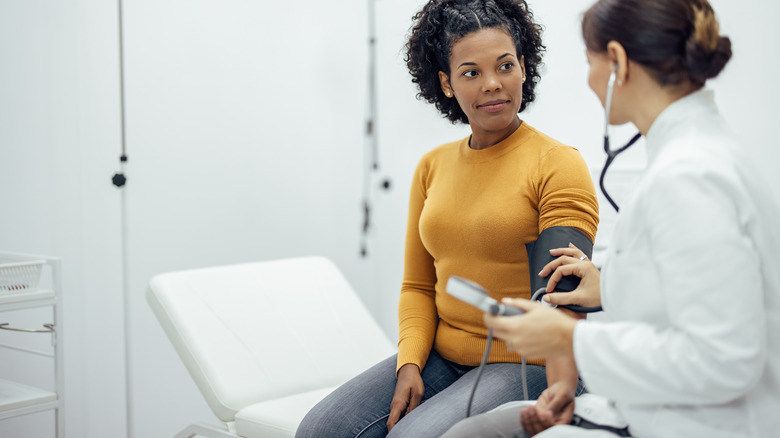What Really Happens To Your Body When You Cross Your Legs
Take a look around trains, buses, offices, and waiting rooms, and you'll quickly notice the dichotomy that exists between how most women sit with their legs neatly crossed and how many men manspread away. Beyond the symbolic meaning behind a woman literally trying to take up as least space as possible while men happily take more than is allotted to them, there is also a sexual undertone. After all, in our patriarchal culture, men should let it all hang out, so to speak, while women should be demure and quiet.
Many men claim they need to spread their legs for the sake of health yet that's not based on fact. "There is no convincing data that sitting with one's legs closed will have a large impact on sperm production or testicular function," says Dr. Michael Eisenberg, a Yale-trained MD and assistant professor of urology at the Stanford School of Medicine (via Yahoo! Health). "Simply sitting with legs closed, especially for a relatively short commute, should be fine."
On the flip side, many women sit down and cross their legs immediately and even involuntarily, since it's how many of us have been taught and then internalized. Yet crossing our legs isn't always comfortable. One leg or foot can fall asleep from crossed legs since the pressure can squeeze blood vessels, as per Los Angeles Nerve Institute. Perhaps the biggest reason to not always keep your legs crossed has to do with your health.
How crossing legs affects blood pressure
"Frequent crossing of the legs also puts stress on the hip joints and can cause pooling of blood in the legs when the veins are compressed," says cardiologist Dr. Stephen T. Sinatra tells ABC News. "This could predispose you to inflammation of the veins of the lower legs and possibly a blood clot."
It can also cause an increase in blood pressure. When you cross your legs, you cut off the blood supply to the rest of your limb which can cause temporary blood pressure spikes (via National Library of Medicine). Though crossing legs at the knee results in a considerable increase in blood pressure, when legs are crossed at the ankle the blood pressure doesn't elevate. However, placing an ankle on a knee can increase blood pressure, as per the Journal of Hypertension.
Hypertension that results from crossing your legs is transient so it goes away when your legs are uncrossed. However, if you have existing high blood pressure, it's better to sit with your legs straight down rather than crossed.
You can misalign your spine when you cross your legs
While crossing your legs is often thought to cause varicose veins, that's actually not true. According to Healthline, there is a big genetic component to getting varicose veins, and standing or sitting for long periods of time can lead to varicose veins, whether your legs are crossed or not.
However, one thing sitting with crossed legs can certainly do is cause the spine to incorrectly position itself, due to the pelvis rotating on an angle. The result is a lot of back pain, not to mention poor posture.
Sitting with knees pressed together can even be problematic. A woman's hips can cause knees to misalign when holding them in tight constraints, as per The Washington Post. It can actually encourage knock knees to develop.
It seems like the best solution for both women and men is to sit in a healthy and comfortable way for your body that is considerate of the people around you — and also yourself.


